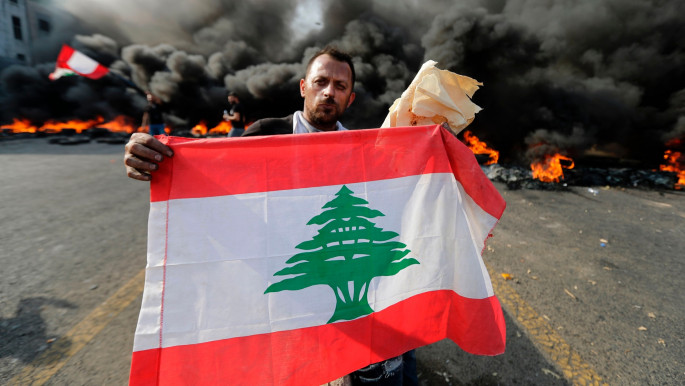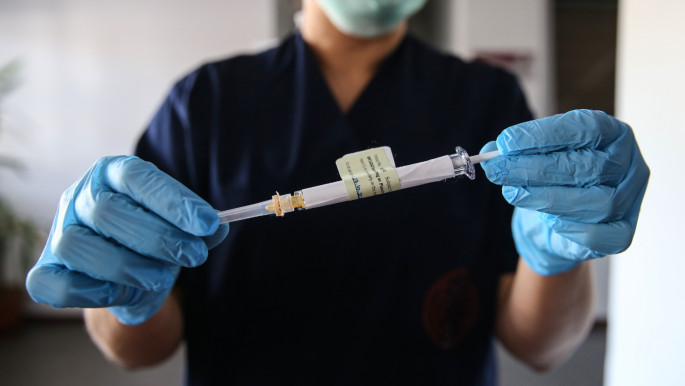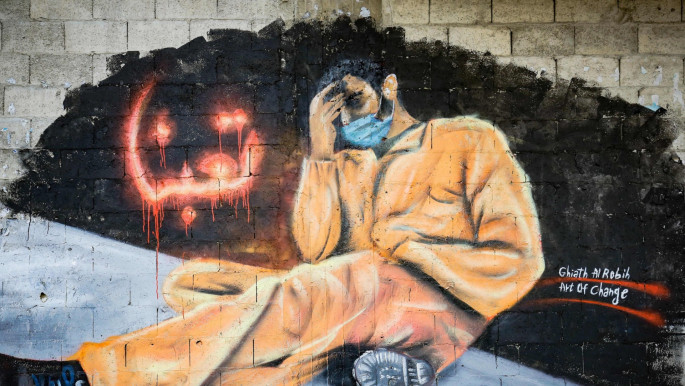Vaccine corruption in Lebanon and the World Bank's dilemma
However, she worries that her parents will never be vaccinated against Covid-19. These fears and frustrations have been expressed by concerned grandchildren and children across the country.
Over one month has passed since Lebanon started its vaccine rollout, but corruption and crises have impeded efforts to immunise the population at speed.
As of 25 March, just under 988,000 people in Lebanon are registered for a Covid-19 vaccine, according to data from IMPACT, an e-Gov platform monitoring Lebanon's vaccine rollout. Around 120,000 people have received one dose of the vaccine, and just under 32,000 have received two doses, out of a population of 6.83 million.
The vaccine rollout has been engulfed by scandal, after the World Bank threatened to suspend funding for Lebanon's pandemic recovery following accusations that government ministers had skipped the queue. It's been almost four weeks since the initial threat, but no action has been taken.
This indecision sends a strong message across the world: operating an effective vaccine rollout involves difficult decisions and complex diplomacy, as well as medical miracles. It is near impossible to separate those who should be punished, from those who will be punished by obstructing vaccine distribution. Ultimately, there is no easy answer to vaccine corruption, whether in Lebanon, or elsewhere.
 |
Over one month has passed since Lebanon started its vaccine rollout, but corruption and crises have impeded efforts to immunise the population at speed |  |
The World Bank in Lebanon
The World Bank has allocated $120 million towards health projects in Lebanon, redirecting $34 million for the vaccine rollout. Without it, the country does not have the resources required, at present, to effectively tackle the pandemic. According to a UN report from August 2020, more than half of Lebanon's population are living in poverty.
In the past year, the Lebanese pound has lost 80% of its value and many citizens have been locked out of their bank accounts. At the start of 2021, the country experienced a surge in covid cases, with 5,870 new cases reported on 16 January at its peak, and hospitals were overwhelmed by the increased demand for urgent health care.
 |
|
| Read more: Lebanon's uphill corruption battle against an 'untouchable class' |
In late February, news broke that government ministers were being vaccinated in parliament before frontline workers and over 75s. Lebanese civilians took to social media in outrage. The World Bank's Regional Director in the Middle East, Saroj Kumar Jha, said: "We would record it [as a] breach of terms and conditions with us for fair and equitable vaccination."
A Beirut-based journalist told The New Arab that people went "crazy" following the tweet. She considered Jha's response to be an "in the moment reaction," and was unsure of the World Bank's official position.
After declining an interview, the World Bank confirmed in a statement to The New Arab that they would, "if necessary... suspend financing for vaccines and the COVID19 response across Lebanon, following reports of violations of the National Deployment and Vaccination Plan." The statement was sent on 25 February.
Since then, no decision has been made on whether suspending the vaccine rollout will take place. A communications officer at the World Bank told The New Arab on 14 March that their verdict was still being decided. It's a "live discussion," they said.
"I'm not surprised by the scandal," said Leyla, "they [government ministers] only care about themselves."
 |
The World Bank threatened to suspend funding for Lebanon's pandemic recovery following accusations that government ministers had skipped the queue |  |
What's happened since
Over the last month Lebanese politicians have both ridiculed and rationally responded to claims of corruption in the country's vaccine rollout.
On 12 March, lawmakers said that they would get their Covid-19 vaccines in the hospital like everyone else. Deputy Speaker Elie Ferzli, who was among those vaccinated, told the Thomas Reuters Foundation that he and other officials would not receive their second dose in parliament.
However, MP Yassine Jaber was quoted in the Financial Times as saying that he wondered what all the fuss was about. He argued that lawmakers were frontline workers and the inoculations were justified.
There was also a case of an 80-year-old musician filing a lawsuit against the health ministry for his right to be vaccinated. "For now, his wait continues," the article read.
A staff member at IMPACT insisted to The New Arab that the government had been complying with the World Bank's regulations. When asked for evidence of compliance they pointed to their Open Data page. They did not respond to questions for further clarity.
The local journalist in Beirut said: "I don't know. There isn't any direct evidence to say if they are complying because there is always talk of politicians giving their own families or people who work for them and their families the vaccine outside of the national vaccine rollout."
 |
|
| Read more: The geopolitics of vaccine diplomacy in the Middle East |
Beyond Lebanon's borders
Lebanon is not the only country to witness government ministers skipping the queue for Covid-19 vaccines. Reports from Argentina, Spain and Peru also accused government officials of receiving early inoculations in secret. However, what makes Lebanon's vaccine scandal different is the country's dependence on international funds and the unapologetic stance of government ministers.
"The implications of the World Bank's decision extend beyond Lebanon's borders," said Aya Majzoub from Human Rights Watch. "What happens in Lebanon will determine what other countries with World Bank financing will do."
Lebanon's generous support package is one of several World Bank-funded schemes combating Covid-19 in less developed countries. Cabo Verde, Mongolia and Tajikistan will also receive large sums of money. By clamping down on Lebanese officials, the World Bank is trying to deter vaccine corruption as early as possible.
However, their indecision over the last month shows the difficulty of enforcing a finance freeze, when the worst impacted will be the country's most vulnerable. Instead, it has created a vacuum for ambiguity to spread.
 |
By clamping down on Lebanese officials, the World Bank is trying to deter vaccine corruption as early as possible. However, their indecision over the last month shows the difficulty of enforcing a finance freeze |  |
Aya thinks the World Bank is in an unenviable position. "If they don't follow through then this sends a message that Lebanese politicians can do what they want." But if they cut funding, Aya explained, then private firms will spearhead the vaccine rollout, so only people with money or connections can get vaccinated.
Karam Karam, a clinical professor of medicine at the American University of Beirut and former Lebanese health minister, said "when there is no equity - when people see that politicians are getting the vaccines...this decreases the faith in the government and any of the steps that it takes. What happened lately is really a step back."
 |
|
| Read more: How Tripoli emerged as the epicentre of Lebanon's national crisis |
Karam considered the World Bank's actions to be a good thing, but an "empty threat." He believed the government ministers acted criminally and lamented that his homeland is now "a failed state, ruined by a corrupt junta of people."
However, unlike Aya, he sees allowing the private sector to import the vaccine as a necessary solution. According to Beirut.com, 25 private companies have been given permits so far that allows them to import vaccines into Lebanon. "If we continue at this pace [without private help], in order to get 80% of the population vaccinated, it's going to take all of 2021, and possibly 2022," said Karim.
Leyla believes the only way to hold ministers to account and secure the future of Lebanon's vaccine rollout is through international pressure. Otherwise, she said, politicians do whatever it takes to save themselves. "I'm scared this scandal is going to keep on repeating itself."
*Name changed to protect identity
Rosie McCabe is a London-based journalist. She is studying journalism at City, University of London with a focus on humanitarian reporting. Her work has been featured in The Guardian, Children and Young People Now, as well as other online publications.
Follow her on Twitter: @RosieMcCabe3





 Follow the Middle East's top stories in English at The New Arab on Google News
Follow the Middle East's top stories in English at The New Arab on Google News


